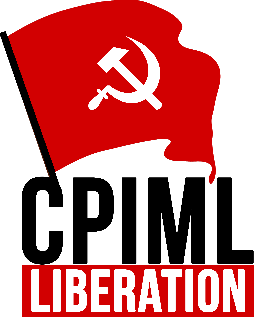Related Research Articles

A Naxal or Naxalite is a member of militant political organisation that claims the legacy of the Communist Party of India (Marxist–Leninist), founded in Calcutta in 1969.

The Communist Party of India (Marxist–Leninist) was an Indian communist party formed by the All India Coordination Committee of Communist Revolutionaries (AICCCR) at a congress in Calcutta in 1969. The foundation of the party was declared by Kanu Sanyal at a mass meeting in Calcutta on 22 April, Vladimir Lenin's birthday. Later the party splintered into several minor Naxal/Maoist groups.
Communist Party of India (Marxist–Leninist) Janashakti, abbreviated CPI (ML) Janashakti, is a communist political party in India.

The Communist Party of India (Marxist–Leninist) Liberation, also referred to as the Liberation group, is a communist political party in India.
Communist Party of India (Marxist-Leninist) is a communist political party in India. After the death of Charu Majumdar in 1972 the CPI (M-L) pro Charu Majumdar central committee was led by Mahadev Mukherjee and Sharma, and the Central Committee took a stand to defend the line of Charu Majumdar on 5–6 December 1972.
Communist Party of India (Marxist–Leninist) Naxalbari was an underground Maoist political party in India. The party had its roots partially in the Maoist Unity Centre, CPI (ML) and partially in the group of Rauf in Andhra Pradesh.

The Provisional Central Committee, Communist Party of India (Marxist–Leninist) is a communist political party in India. The general secretary of the party is Santosh Rana. The party is often referred to as CPI(ML) [Santosh Rana Group] or likewise.
The Central Reorganisation Committee, Communist Party of India (Marxist-Leninist) was a communist group in India 1979–1991. The Secretary of the All-India Leading Committee of the CRC, CPI(ML) was K. Venu. The main organ of CRC, CPI(ML) was called Mass Line. CRC, CPI(ML) also published Liberation and Comrade.

Communist Organisation of India (Marxist–Leninist) was a political organisation in India. COI (ML) was formed in May 1985 through the merger of six different groups;
The Maoist Communist Centre (MCC) was one of the largest two armed Maoist groups in India, and fused with the other, the People's War Group in September 2004, to form the Communist Party of India (Maoist).
Kondapalli Seetharamaiah was a senior communist leader and Maoist organizer in India.
Communist Party of India (Marxist–Leninist) Bolshevik was a small communist party in India. It was formed by Jayshree Rana, who broke with her husband's CPI (ML) after they had decided to run in elections in mid 1977.
Vempatapu Satyanarayana (Satyam) was a schoolteacher, member of several Indian Communist organizations, and a leader of the Srikakulam peasant uprising of 1967, along with Adibhatla Kailasam. They had started the "land to tiller" movement in Andhra Pradesh, which later spread to South Orisa.
Communist Party of India (Marxist–Leninist) People's War, usually called People's War Group (PWG), was an underground communist party in India. It merged with the Maoist Communist Centre of India to form the Communist Party of India (Maoist) in 2004. Muppala Lakshmana Rao ('Ganapathi') was the general secretary of the party. The ideology of the party was Marxism-Leninism-Maoism.
The Central Organising Committee, Communist Party of India (Marxist–Leninist) Party Unity, more commonly known as CPI(ML) Party Unity or simply 'Party Unity', was a communist party in India 1982-1998. Narayan Sanyal (politician) alias Naveen Prasad was the general secretary of the party. Party Unity was the official organ of the party. CPI(ML) Party Unity was one of the predecessors of the Communist Party of India (Maoist).
Satyanarayan Singh was an Indian communist politician. Singh was one of the early leaders of the Communist Party of India (Marxist-Leninist), being its secretary in Bihar.
Sushital Ray Chowdhary or Sushital Raychaudhury was an Indian Communist intellectual and revolutionary, active in the early all-India organization of the Naxalite groups and the formation of the Communist Party of India (Marxist-Leninist). He was the editor of the organs of the CPI, CPI(M) and CPI(ML). He eventually fell out with the mainstream Charu Majumdar group and died of a heart attack in 1971.
Naxalbari uprising was an armed peasant revolt in 1967 in the Naxalbari block of the Siliguri subdivision in Darjeeling district, West Bengal, India. It was mainly led by tribals and the radical communist leaders of Bengal and further developed into Communist Party of India (Marxist–Leninist) in 1969. The event became an inspiration to the naxalite movement which rapidly spread from West Bengal to other states of India creating division within the Communist Party of India (Marxist) party.
Central Organising Committee, Communist Party of India (Marxist–Leninist) was a communist party in India, one of the main splinter factions of the original Communist Party of India (Marxist–Leninist). COC, CPI(ML) occupied a middle position between the pro-Charu Majumdar group led by Mahadev Mukherjee and the anti-Majumdar group led by Satyanarayan Singh. Failing to articulate a common ideological position, COC, CPI(ML) soon suffered internal divisions and splits. Two of the splinter groups of COC, CPI(ML) in Andhra Pradesh are predecessors of the present-day Communist Party of India (Maoist).
R.N. Upadhyaya was an Indian politician and trade unionist. He joined the Hindustan Socialist Republican Army in 1938. In 1940 he became a member of the Revolutionary Socialist Party. He participated in the August 1942 Quit India movement. He was jailed for his role in the independence struggle, and was released in 1946. He joined the Communist Party of India in 1952.
References
- ↑ Ghose, Nimai (1997). "Homage". Liberation. Communist Party of India (Marxist–Leninist) Liberation. 4: 12. Retrieved 31 October 2012.
- ↑ Singh, Prakash, The Naxalite Movement in India. New Delhi: Rupa & Co., 1999, ISBN 81-7167-294-9, p. 40-41.
- ↑ Singh, Prakash, The Naxalite Movement in India. New Delhi: Rupa & Co., 1999, ISBN 81-7167-294-9, p. 97, 105.
- ↑ Hindustan Times: History of Naxalism [ permanent dead link ]
- ↑ Singh, Prakash, The Naxalite Movement in India. New Delhi: Rupa & Co., 1999, ISBN 81-7167-294-9, p. 129.